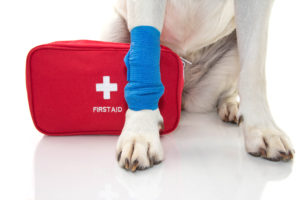How to Keep Your Pets Warm During the Winter

By Patricia Thomblison, DVM, MS
WINTER IS COMING. Leaves are falling and the heaters are being serviced to prepare for the coming chill. Your skin may already be drying out and find you are applying copious amounts of lotion. It’s not just you, your pets may also face several hardships during the cold winter months. Here are some tips to keep them healthy and safe.
 OUTDOOR ACTIVITIES
OUTDOOR ACTIVITIES
Some dogs appreciate the cold air and love to play in frigid temperatures but know your pets’ limits. Senior dogs, younger dogs, pets with thin hair coats may not tolerate the cold for very long. Some pets may benefit from sweaters or jackets, but remember, if it’s too cold for you, it’s probably too cold for them.
SNOW AND ICE
Snow and ice can create several problems. Snow-and ice-balls form on the fur and feet of some dogs. These should carefully be removed with a warm bath or a hairdryer. Pulling them can hurt and may even damage the skin. Trimming the fur around the feet can reduce the accumulation.
PAW PATROL
Salt, ice melt, and antifreeze are just some of the harmful chemicals that can get on your pets’ feet in the wintertime. Pet safe de-icer products can be purchased to be used around your home if needed. After walks, gently wash their feet so your pet doesn’t lick toxins and become sick. Be extra cautious to clean spills that can accumulate under a car. The winter air can cause paws to dry out. It is important to regularly inspect your pet’s paws to be aware of any changes. Many pets will benefit from booties as well as a skin topical such as the ZYMOX® Leave-On Conditioner that can be applied like a lotion to almost all areas of their body including their paws to hydrate.
DRY HEATED AIR
Dry air can irritate a pet’s skin. With their heavy winter coat, you may not notice the flaking and skin irritation, but the damage may lead to more serious problems. Using a gentle cleanser like ZYMOX Shampoo followed by ZYMOX Leave-On Conditioner can help to soothe the skin.
WATCH THEIR WEIGHT
Calorie needs may change with the change of weather. Some pets will need more calories if they are playing outside and need to stay warm. Others will need fewer calories as they snuggle under blankets and are not as active. Monitor both the intake and their weight to determine the best recommendation for your pet.
 EMERGENCY KIT
EMERGENCY KIT
It’s always a good idea to have an emergency plan for your pet because winter weather extremes can cause power outages or worse. Your emergency kit should have enough food, water, and medications for each pet to last five days or so. Include your veterinarian’s information in case you need to contact them.
OUTDOOR LIVING
It’s best if you keep your pets inside during weather extremes. At a minimum be sure they have shelter in a dry place away from the wind. Provide potable water and food. Strays and feral cats may seek shelter in wheel wells or warm cars. Bang on the hood of your car or honk the horn before starting the car to avoid injuries.
As the seasons change so will the needs of your pet. These are just a few of the things to watch out for this winter. Be sure to talk to your veterinarian about any concerns you have. Every pet is unique and will respond to conditions differently.
Keep Your Pet’s Skin Clean and Health with ZYMOX Dermatology Products
Explore our collection of trusted ZYMOX Dermatology pet care products. PKB Animal Health, a division of Pet King Brands, Inc. has been helping veterinarians care for their patients for over twenty years. For more information or inquiries, please contact us today.
ABOUT THE AUTHOR
 Dr. Patricia Thomblison is a graduate of Oklahoma State University where she earned her Doctor of Veterinary Medicine and Master of Science. She has devoted her career to keeping pets healthy and happy. She has served many roles in this endeavor to educate veterinary professionals and pet parents on many topics of animal health. She has worn several hats in the areas of clinical pathology, nutrition, and parasitology. She is a well-respected medical editor, veterinary consultant, and lecturer. She enjoys the company of her two cats, Miles Davis and Stewart, as well as a rambunctious dog named Barnibus and her children’s dogs.
Dr. Patricia Thomblison is a graduate of Oklahoma State University where she earned her Doctor of Veterinary Medicine and Master of Science. She has devoted her career to keeping pets healthy and happy. She has served many roles in this endeavor to educate veterinary professionals and pet parents on many topics of animal health. She has worn several hats in the areas of clinical pathology, nutrition, and parasitology. She is a well-respected medical editor, veterinary consultant, and lecturer. She enjoys the company of her two cats, Miles Davis and Stewart, as well as a rambunctious dog named Barnibus and her children’s dogs.

